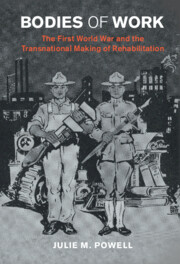Book contents
- Bodies of Work
- Studies in the Social and Cultural History of Modern Warfare
- Bodies of Work
- Copyright page
- Dedication
- Contents
- Figures
- Tables
- Acknowledgements
- Introduction: Whole Nations in Arms
- 1 The Gospel of Rehabilitation
- 2 A Great Army of Industrial Soldiers
- 3 A Duty Incumbent on All Allied People
- 4 He Marches Off On an Entente Leg
- 5 A Charge Almost If Not Quite as Sacred
- Conclusion: The Right to Rehabilitation
- Bibliography
- Index
5 - A Charge Almost If Not Quite as Sacred
Published online by Cambridge University Press: 20 October 2022
- Bodies of Work
- Studies in the Social and Cultural History of Modern Warfare
- Bodies of Work
- Copyright page
- Dedication
- Contents
- Figures
- Tables
- Acknowledgements
- Introduction: Whole Nations in Arms
- 1 The Gospel of Rehabilitation
- 2 A Great Army of Industrial Soldiers
- 3 A Duty Incumbent on All Allied People
- 4 He Marches Off On an Entente Leg
- 5 A Charge Almost If Not Quite as Sacred
- Conclusion: The Right to Rehabilitation
- Bibliography
- Index
Summary
Chapter 5 highlights the role of disabled veterans in establishing rehabilitation rights at both the national and international levels. It examines, particularly, the involvement of ex-servicemen in the work of the Disablement Branch of the International Labour Organization. Moreover, it answers the question posed by government, military and medical authorities, reformers, and the public-at-large about what was to become of the rehabilitation programmes and technological advances that the war had wrought. The Allied culture of rehabilitation provided the framework for disabled civilian workers and their advocates to lobby for an extension of rehabilitation rights to the industrially disabled, yet, in the end, the expansion of soldiers’ rehabilitation programmes to the civilian body remained largely elusive until the Second World War. Attempts to capitalise on the popular zeal for rehabilitation collapsed as gendered comparisons between soldiers and labourers fell short of their aims, patriotism and wartime collectivist sentiment lost their coercive force, and the political climate turned, bringing the reform era that had launched rehabilitation to a close.
- Type
- Chapter
- Information
- Bodies of WorkThe First World War and the Transnational Making of Rehabilitation, pp. 183 - 220Publisher: Cambridge University PressPrint publication year: 2022



